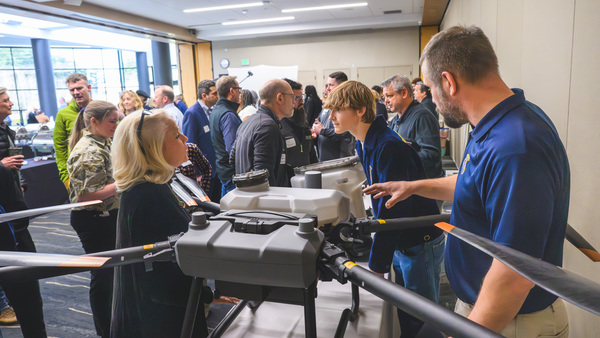Washtenaw ISD Career Technical Education Summit Unites Education, Industry, and Community Leaders

What does the future of applied and experiential learning and workforce development look like in Washtenaw County? For more than 200 educators, students, industry leaders, government officials, and community partners who gathered this week at the Washtenaw Intermediate School District (ISD)’s Education Summit, the answer was clear: Career Technical Education (CTE) is transforming how students prepare for college and careers. Through hands-on learning, industry partnerships, and real-world experience, local CTE programs equip students to discover and design their path to success.
The summit, held at Washtenaw Community College’s Morris Lawrence Building on Tuesday, March 18, 2025, served as a call to action, with speakers highlighting the urgent need to expand access to CTE programs for Washtenaw students by breaking down barriers to meet the growing demand. “At a time when our 9th-12th grade student population is decreasing across the state of Michigan, including in Washtenaw County, our CTE enrollment has doubled in the past four years,” said Dr. Ryan Rowe, Washtenaw ISD CTE Director. “Despite adding numerous programs through one-time grant funding and public-private partnerships, we cannot keep up with student demand.” Rowe also discussed the evolution of CTE in the last decade, preparing students for a variety of high-wage, high-skill, in-demand careers across all levels of postsecondary educational attainment. “These are future-focused programs that are no longer just an alternative to college, but a pathway to and through college.”
Dr. Alena Zachery-Ross, Superintendent of Ypsilanti Community Schools, emphasized the transformative impact of CTE, describing it as a bridge between classroom learning and real-world application. “CTE is a game-changer that provides hands-on experiences that bring learning to life,” said Dr. Zachery-Ross. “It ensures our scholars graduate with the skills, the confidence, and the direction needed for high-wage, high-tech careers of the future. CTE is not a program, it is a promise.”
Dr. Brandon Tucker, Executive Vice President of Instruction of Washtenaw Community College, encouraged an ongoing commitment to collaboration between K-12 education, postsecondary institutions, and industry partners to build the talent pipeline. “There are thousands of jobs going unfilled in southeast Michigan every day because there is a void,” said Tucker. “I believe we can solve what has been a decades-old issue of a lack of support for CTE collaboratively across our region. The time is now, and the opportunity is ahead; how we seize that opportunity is up to all of us working together.”
CTE alumni also took the stage to share personal success stories, illustrating how participation in these programs helped them launch careers in high-demand fields. Jochen Faber, Managing Director of Liebherr Aerospace Saline, Inc., discussed his life experience as proof that CTE is a viable solution to the technical skills gap that exists in education today. “Finding your career and finding your passion are very closely related,” said Faber. “Passion is nurtured through early education and CTE is the secret sauce in this recipe.”
Cindy Elliott, RN, FACHE, President of Trinity Health Michigan Medical Groups, also praised the CTE opportunities she accessed in Milan Area Schools before going on to be a first-generation college graduate in her family. “[My CTE program] provided a path for me going forward that I would not have otherwise had,” said Elliott. “It equipped me to serve in clinical positions right out of high school, allowing me to work in health care day one and help pay for my college nursing program. I am a firm believer that making an investment in a student today will pay dividends for many years to come, and I know I am proof of that.”
The summit also featured interactive engagement stations where student leaders from various CTE programs demonstrated their skills and shared insights into their educational journeys. Following the hands-on exhibits, a series of speakers underscored the role of CTE in preparing students for success in college, careers, and beyond. The summit concluded with a panel discussion, where key policymakers and community advocates stressed the economic, workforce, and social benefits of increasing CTE opportunities in the K-12 setting.
